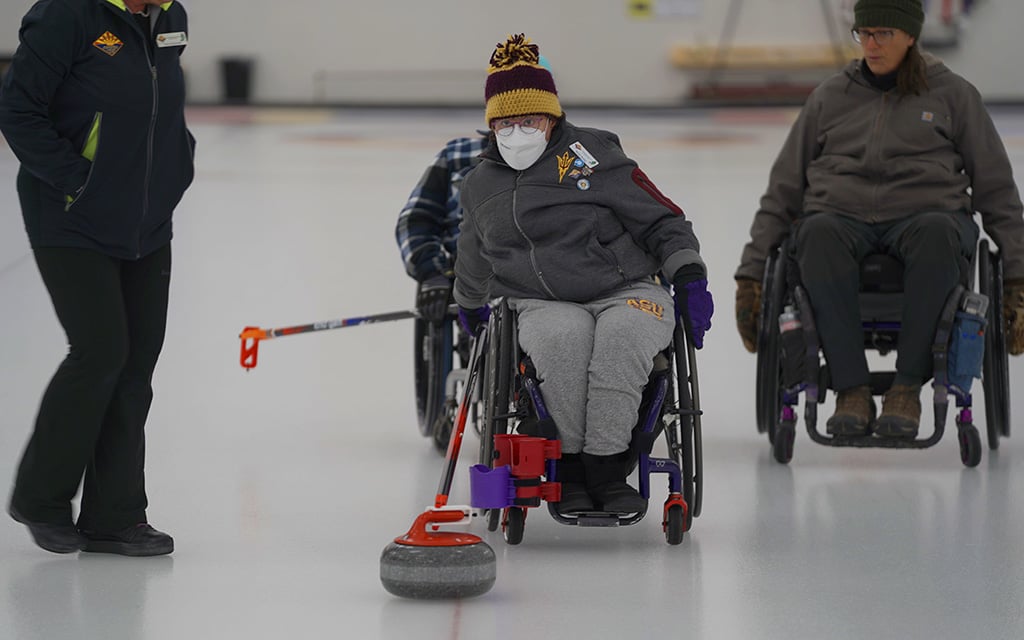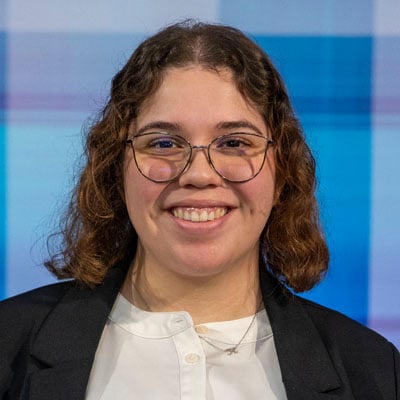TEMPE – In the sweltering heat of Arizona, an unlikely winter sport is sliding into popularity. Curling, traditionally associated with icy northern climates, has found an unexpected home in the desert state. Sparked by the excitement of the 2022 Beijing Winter Olympics, the ice sport is gaining traction among Valley residents.
Ability360 capitalized on the momentum from May to June by hosting six weeks of wheelchair curling clinics at the Coyotes Curling Club in Tempe, where participants learned the techniques required to master the game on ice.
Ability360, a nonprofit organization run by and for people with disabilities to address the needs and barriers within Arizona, aims to empower individuals to achieve or continue independent lifestyles within their community. Through programs like the curling clinics, they are opening up new possibilities for adaptive sports.
As Tim Surry, Ability360’s director of first impressions and wheelchair curling program coordinator, puts it: “We all got on the ice and … just fell in love with it. We started doing some curling clinics and more and more people came. Then it eventually led to this, where we actually have eight people, which is a perfect number – it’s four on four on the ice.”
This summer’s clinics not only taught participants the skills needed for wheelchair curling but also fostered a sense of community and camaraderie among attendees. The fun of throwing a stone in the house is a highlight, but one thing that steers people away from participating in curling is the fear of falling.
Coyotes Curling Club coach Patrick McDonald, however, says there’s no need to worry while using the right equipment. Before going on the ice, everyone is required to have grippers over their shoes to prevent falls. Wheelchair curlers also have to ensure their tires are cooled before going on the ice.

Ability360 participants learn the basics of wheelchair curling during a six-week clinic at the Coyotes Curling Club in Tempe. (Photo courtesy of Karam Gafsi/Ability360)
“If you went out in your tennis shoes, the rubber compound in your soles are a little slippery and they’ll take a while to cool down,” said McDonald, a former Paralympian. “When you first go out or if you try to push pretty quick, you’ll slip and slide. That’s why I have all the participants roll up and down. Once the tire rubber cools down, you can push normal and the rubber grips the ice. You’re good to go.”
Wheelchair curling has been a way to teach a new skill and make new friends. Heather Hoffmeister has been wheelchair curling for five years and said that the clinic has allowed her to learn how to curl and make new connections.
“It gets you out of the house,” Hoffmeister said. “You just have to do it in your own way and wheelchair curling helps let you curl. You might have to use a stick or something like that, but you still get to have the fun.”
In traditional curling, a team of four plays 10 ends known with a total of eight stones (two stones per person). The rules of wheelchair curling are similar, but they play eight ends. Wheelchair curlers also use specially designed sticks, made by McDonald with carbon fiber tubes, to help lead the stone.
“In the Olympics, in able-bodied, there’s sweeping,” McDonald said. “That allows the stone to stay straighter and go further, not faster. In wheelchair, there’s no sweeping, so we have to be more precise and the chair has to be in a stationary position.”
For McDonald, transitioning from player to coach has been meaningful after injuries prevented him from continuing to play. He’s particularly proud of the diverse range of participants in wheelchair curling.
“Seeing some of the people that come through the door with whatever impairment that they have a good imagination and the knowledge of the game, we can get anybody out there to deliver a stone,” McDonald said.
